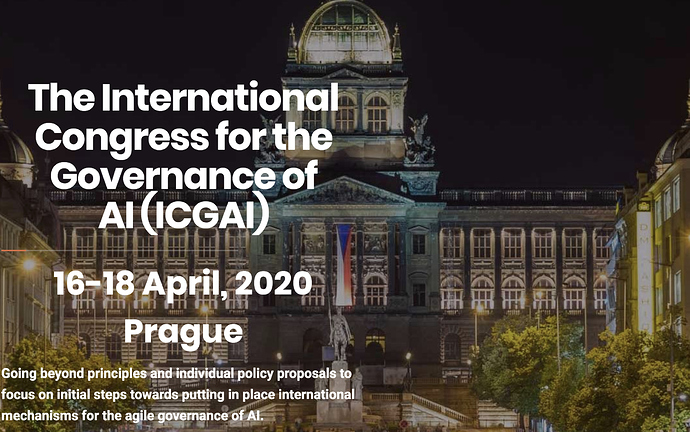It has happened so I has participated in one of the workshops preparing the [International Congress for The governance of AI https://icgai.org/ (IGCAI) to take place in Prague, 16-28 April, 2020
Here are few key points that I have realised for myself as follows.
- The main problem is not about AI, it is about the people using the AI to get profits by means of:
1.1. Pumping data out of people to re-sell the data (profiling) for better business and political advertising;
1.2. Manipulate people by means of advertising business and political agendas maximising the profits of sellers and not the quality of life of the people. - The above is complicated by
2.1. Society of consumption economy, where business models and respective advertising is focused on increase of consumption instead of quality of life;
2.2. Global nature of the business models worldwide given global business is run by global corporations (directly or indirectly) maximising their profits;
3.3. Local national governments being incapable to resist global corporation due for the financial powers of global corporations exceeding the financial powers of local national governments (non-operable anti-trust regulations are just one example). - While most of AI developments is run by global corporations, regulation of that is complicated because global corporations working in concurrent conditions of modern capitalism economy unlikely welcome any regulations unless the regulations affect them all to the same extent at global scale otherwise that would affect their competitive advantages. That is, global corporations, developing the AI (and using the peoples’ data and being able to manipulate the people) are expected to be highly reluctant to local national regulations.
- Local national restrictive regulations applied to global corporations at local national scales may slowdown technological development of locally nation-wide, so the nations are negatively affecting their own developments if the restrictive regulations applied locally. Which mean and local national regulations would hurt the nations in condition of global competition worldwide.
- Given the above, the regulations could be acceptable by both global corporations and local nations only in the case if regulations are applied globally without of excluding any jurisdictions of the major stakeholders - local national regulations in US, EU and China and top 10 IT/AI corporations in US? and China such as Google, Apple, Microsoft, Facebook, Amazon, Baidu, Tencent, Alibaba.
- Besides regulations assessing inequality, the regulations preventing weaponisation of AI can not also be achieved if any major governments is excluded from the regulation negotiation and adoption processes or excludes itself.
- Respectively, the AI governance effort is doomed unless it can involve both major national governments and global business corporations - both. It is most likely it has happened with nuclear regulation involving co-operation of the governments but the problem with AI is made more complex with the need to involve global corporations.
- That is, the only way to ensure efficient cooperation at both governmental and business levels is to treat global inequality boost potentially caused by commercialisation and dangers caused by AI is agreement across all major governmental and global business stakeholders.
- One way to reach the agreement on the need for regulations is presenting reliable, representative and presentable simulations of developmental curves of social state of the world given the different regulations scenarios to prove the need of the regulation for the major stakeholders. Similar work has been done preparing the nuclear regulations simulating the “nuclear winter” caused by use of nuclear power in military conflicts.
- If the agreement on the need for regulation is reached at global national and governmental levels, the balance of the regulatory and permissive terms should be balanced so the negative and positive impacts of the regulations are maximising overall combination of equity, equality and security at the scale of the community worldwide.
- The simulations of the social state of a large community for balancing equity, equality and security have been carried out earlier with studies made by SingularityNET Foundation foundation and presented at AI4SocialGood workshop at IJCAI-2019 conference as referenced below so the approach and technology may be employed and developed further justifying the need and possibility for AI regulations.
References
A Liquid Democracy System for Human-Computer Societies ( slides )
A Reputation System for Market Security and Equity ( slides)


